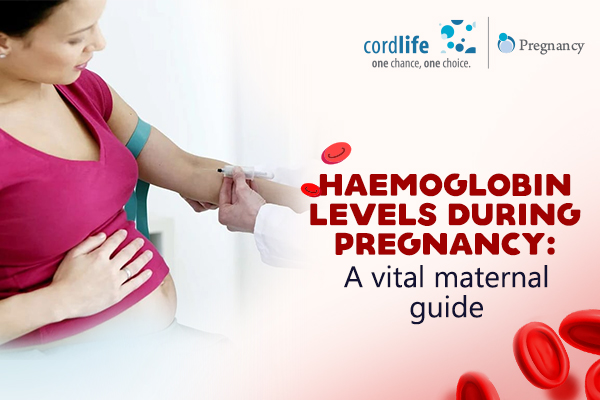Table of Contents
Haemoglobin basically is protein present in red blood cells, that helps in transferring oxygen to various tissues and organs of the body and transporting carbon dioxide from organs and tissues back to lungs.
Iron is the main component in haemoglobin, that helps in carrying oxygen from the lungs to the different parts of the body. While the normal range for haemoglobin for men is between 13.5 to 17.5 grams per deciliter, for women it is between 12.0 to 15.5 grams per deciliter. Anything lower than this range would result in iron deficiency. Without enough iron, there won’t be enough red blood cells to transport oxygen, which would result in fatigue and anaemia.
During pregnancy, you would require more oxygen to provide the all-essential oxygen and nutrients for the developing baby inside you.
What Is The Importance Of Haemoglobin During Pregnancy?
In order to understand the ideal blood level, blood is collected for testing not only with the progression of your pregnancy, but also during your labour and the delivery of your baby. Usually, the haemoglobin level ranges between 11.5 – 13.0 (13.5) g/dl, during your pregnancy. But, if your haemoglobin level falls under 11 g/dl, you are most likely to suffer from anaemia.
Approximately 50% of pregnant women are considered anaemic.
Going deeper,
- You will show signs of anaemia in your first trimester, if your haemoglobin concentration is lower than 11.6 g/dl (gram per deciliter), (10.6 haemoglobin level during pregnancy, is a strong indicator of anaemia. Iron supplement may be frequented during this time).
- You will also suffer from anaemia in your second trimester, if your haemoglobin concentration is lower than 9.7 g/dl (gram per deciliter).
- In your third trimester, if your haemoglobin level is lower than 9.5 g/dl (gram per deciliter) you might certainly be anaemic. Also, according to WHO, UNICEF, UNO and IDA, if the haemoglobin level, especially during your third trimester is 8 or 8.5, there are chances that you will be experiencing mild, moderate and severe anaemia respectively.
Studies have also claimed that 98% maternal deaths occur in developing countries due to anaemia. If you fall under this percentage, then anaemia can be detrimental to your baby’s development, while you’re pregnant and can result in birth defects in babies like low birth weight. You might also have to undergo an Emergency C – Section.
What Are The Symptoms Of Low Haemoglobin Levels During Pregnancy?
As mentioned earlier, haemoglobin levels below 10.5g/dl, during pregnancy can affect you greatly. You will show signs of anaemia and they include :
- Fatigue
- Weakness
- Pale or yellowish skin
- Irregular heartbeats
- Shortness of breath
- Dizziness or light-headedness
- Chest pain
- Cold hands and feet
- Headache

What Are The Causes Of Low Haemoglobin Level During Pregnancy?
Factors that contribute to lower blood levels during your pregnancy include:
- substantial blood loss
- Iron, Vitamin B-12, or folate deficiency
- hypothyroidism, or a thyroid gland that does not produce enough hormones
- thalassemia, a hereditary disease that prevents haemoglobin from functioning properly
- sickle cell anaemia, a genetic disorder that causes a reduction in red blood cells and haemoglobin
How To Reach The Ideal Blood Level During Pregnancy?
Since haemoglobin levels during pregnancy are considered to be the most important, you should consult the doctor and change your diet so as to replenish iron and reach the ideal blood level during pregnancy.
And The List Of Foods Include
- Intake of foods rich in iron like meat and fish, soy products, eggs, dried fruits, and green veggies
- Intake of folate rich foods like spinach, rice, lettuce, avocados, kidney beans, etc.
- Intake of foods rich in vitamin C such as fruits and leafy greens
- Intake of iron supplements in consultation with the doctor.
As per the above- mentioned facts and evidences Iron deficiency in blood during pregnancy means lower haemoglobin levels or anaemia during your pregnancy. Similarly, iron supplementation during pregnancy increases the haemoglobin concentration of pregnant women by 1.02 g/dl. The mean haemoglobin concentration of women with a history of iron supplementation during pregnancy is 1.02 g/dl higher. But, to keep the haemoglobin levels normal during your pregnancy, eat a balanced diet, stay active and don’t miss your pre-natal doctor visits.
Also remember, pregnancy is one of the beautiful phases in your life. This is the time to nurture yourself and your baby in every possible way. And while you’re taking care of yourself, don’t forget to include cord blood banking not only to safeguard your baby’s health, but also to safeguard your family’s healthy future.
